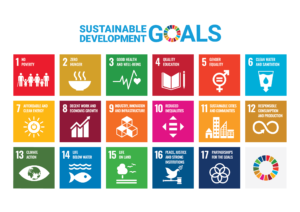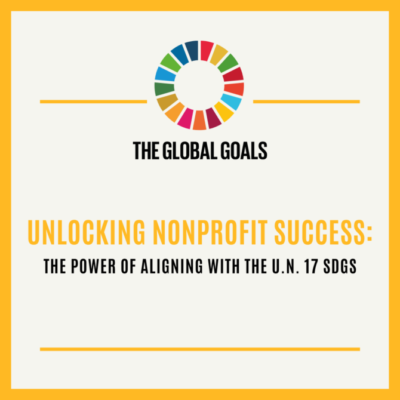Introduction
The world faces a myriad of challenges, ranging from poverty and hunger to climate change and inequality. To tackle these global issues and pave the way for a better future, the United Nations (UN) has set forth a structure known as the Sustainable Development Goals (SDGs). These 17 goals, with their ambitious targets, serve as a roadmap for sustainable development.
The United Nations’ Sustainable Development Goals, adopted in 2015, cover a wide range of interconnected issues, including education, health, gender equality, clean energy, and more. The SDGs provide a comprehensive framework that encourages collaboration and action from governments, businesses, civil society, and nonprofits. In this article, we will explore the significance of the SDGs and delve into the pivotal role nonprofits play in achieving these goals.
Table of content:
- What are the United Nations SDGs?
- Importance of Sustainable Development Goals
- Role of Nonprofits in Achieving SDGs
- Challenges Faced by Nonprofits
- Mobilizing Resources
- Strategies for Effective Nonprofit Impact
- Collaborations for SDG Achievement
- Monitoring and Evaluation of SDG Progress
- Creating awareness and Advocacy
- Examples of Nonprofits Supporting SDGs
- FAQs
The United Nations SDGs are a collection of 17 global goals that address the most pressing social, economic, and environmental challenges of our time. Each goal has specific targets to be achieved by 2030. These goals include ending poverty and hunger, ensuring quality education, promoting sustainable economic growth, and fostering environmental sustainability.

You can find detailed information about each SDGs on the United Nations’ website https://sdgs.un.org/goals
Click here to watch a video to get to know all the SDGs
The SDGs are crucial for creating a sustainable and inclusive future. They serve as a blueprint for countries and organizations to align their efforts and resources towards common objectives. By addressing issues such as poverty, inequality, and climate change, the SDGs promote a holistic approach to development, leaving no one behind.
Nonprofit organizations play a vital role in advancing the SDGs. With their agility, grassroots connections, and community-focused approach, nonprofits are uniquely positioned to drive change at the local level. These organizations work tirelessly to address societal challenges, mobilize resources, raise awareness, and implement sustainable solutions.
Although nonprofits play a crucial role in achieving the SDGs, they encounter various challenges along the way. Limited funding, bureaucratic hurdles, and lack of awareness are common obstacles faced by these organizations. Additionally, the complex nature of sustainable development requires nonprofits to navigate intricate systems and collaborate effectively.
The United Nations 17 SDGs can help nonprofits mobilize resources for their initiatives. The global recognition and support for the SDGs make it easier for nonprofits to attract funding from various sources, including government grants, corporate sponsorships, and individual donations. The goals act as a compelling argument for investment in projects that align with the SDGs, as they demonstrate a commitment to long-term sustainability and positive social impact.
To maximize their impact, nonprofits can adopt several strategies. Firstly, they can establish partnerships with other organizations, including governments, businesses, and academic institutions. By leveraging combined expertise and resources, nonprofits can drive systemic change. Secondly, they can harness technology and innovation to create scalable solutions. Lastly, advocating for policy changes and empowering local communities are essential for sustainable development.
The SDGs necessitate collaborative efforts from all sectors of society. Governments, nonprofits, businesses, and individuals must work together to achieve these goals. Collaborative platforms, such as the UN Global Compact and local coalitions, facilitate coordination and knowledge sharing among diverse stakeholders. Through collective action, we can overcome the challenges impeding progress.
Effective monitoring and evaluation mechanisms are vital for tracking progress towards the SDGs. Nonprofits, alongside governments and international organizations, play a key role in collecting data, assessing impact, and identifying areas requiring attention. By measuring results and sharing best practices, we can optimize strategies and make informed decisions.
The SDGs provide nonprofits with a platform to raise awareness about critical issues and advocate for change. By aligning their messaging with the goals, nonprofits can effectively communicate the urgency and importance of their cause to a broader audience. The SDGs serve as a powerful tool for storytelling and engaging stakeholders, inspiring them to take action and support the nonprofit’s mission.
Numerous nonprofits around the world are actively engaged in supporting the SDGs. Here are a few examples:
Support Black Charities – Global
- SDG#8 (Decent work & Economic Growth) – focus on promoting inclusive and sustainable economic growth by providing essential services to Black organizations worldwide.
- SDG#17 (Partnership for the goals) – sharing resources and facilitating Global Partnerships for sustainable development.
VX3 Exchange – Canada
- SDG#17 (Partnership for the goals) – connecting BIPOC communities through media.
Durham Region Association of Black Professionals and Entrepreneurs – DRABPE – Durham, Ontario, Canada
- SDG#8 (Decent work & Economic Growth) – providing support to Black businesses by giving them access to a network of services, businesses and professionals with the goal of mutual support, encouragement, and resources within the Region.
Centre for Sustainable Access to Health in Africa – CeSAHA – Nigeria, Africa
- SDG#3 (Good Health and Well-Being) – advocating for access to health and promoting Universal Health Coverage for all in Africa.
Conclusion
The United Nations 17 SDGs Sustainable Development Goals provide a comprehensive framework for nonprofits to contribute to creating a sustainable and equitable future for all while addressing the world’s most pressing challenges. Nonprofits, with their dedication, innovation, and community-driven approach, are instrumental in achieving these goals. By aligning their work with the SDGs, nonprofits can focus on global challenges, mobilize resources, foster collaboration, create awareness, and measure their impact effectively. It is essential for nonprofits to embrace the SDGs and integrate them into their mission and strategic planning to maximize their contribution towards sustainable development.
By supporting and collaborating with nonprofits, we can create a future that is sustainable, equitable, and prosperous for all.
Frequently Asked Questions
-
How can individuals support nonprofits working towards the SDGs?
Individuals can support nonprofits by volunteering, donating, or advocating for their causes. By spreading awareness and actively engaging with nonprofits, individuals can contribute to their mission of achieving the SDGs.
-
Can businesses play a role in supporting the SDGs?
Absolutely! Businesses can integrate sustainable practices into their operations, support social initiatives, and collaborate with nonprofits. By aligning their business objectives with the SDGs, companies can drive positive change and contribute to sustainable development.
-
How can nonprofits overcome funding challenges?
Nonprofits can diversify their funding sources by exploring grants, corporate sponsorships, individual donations, and crowdfunding. Building strong relationships with donors and demonstrating impact are key to securing sustainable funding.
-
Are there any SDGs that receive less attention from nonprofits?
While nonprofits work across various SDGs, some goals, such as SDG 14 (Life Below Water) and SDG 16 (Peace, Justice, and Strong Institutions), may receive relatively less attention. However, there are organizations dedicated to these goals, and efforts are being made to address the gaps.
-
How can nonprofits measure their impact on the SDGs?
Nonprofits can measure their impact through various indicators and data collection methods. Key performance indicators (KPIs), surveys, and progress reports help evaluate progress and identify areas for improvement. Monitoring and evaluation frameworks, such as the Theory of Change, assist in assessing long-term impact.


